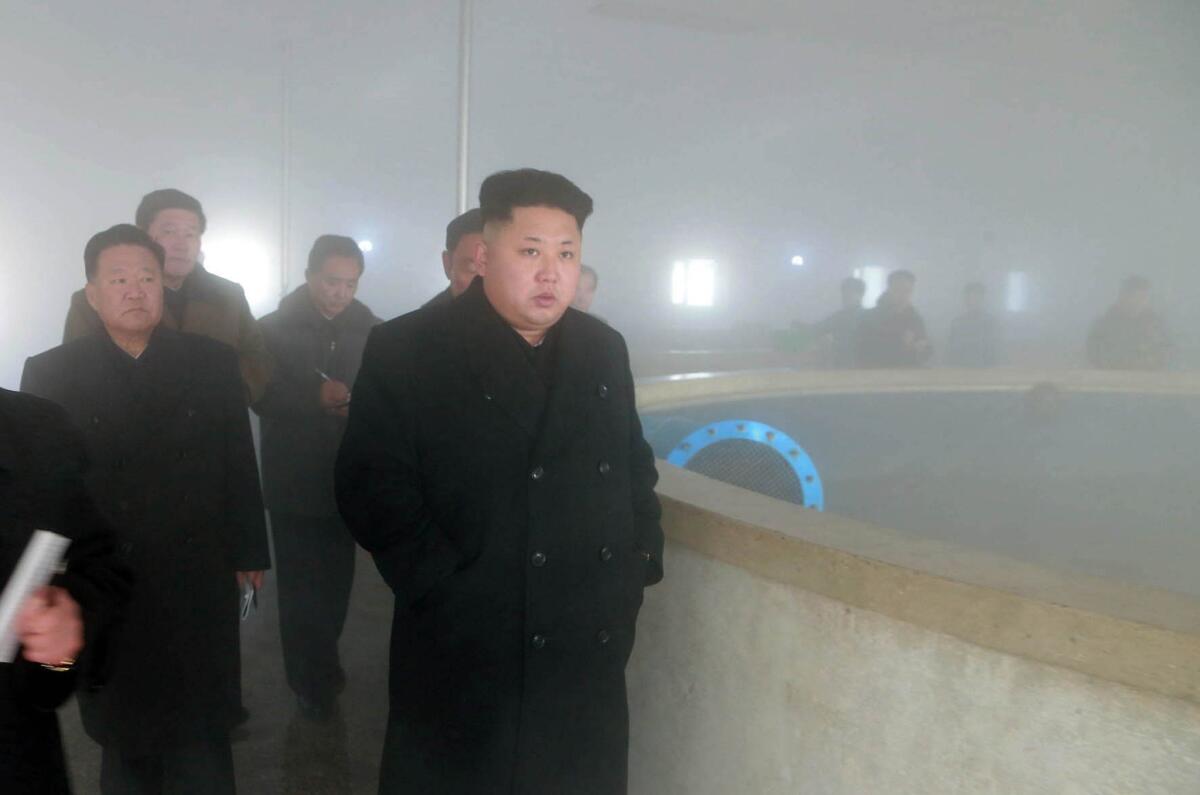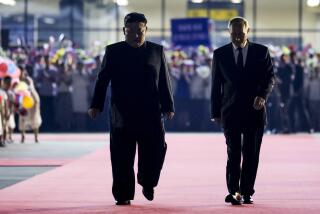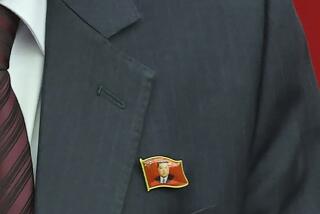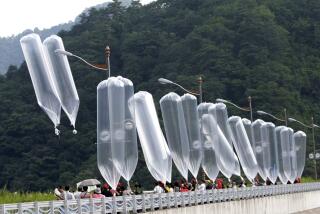Review: Getting to know Kim Jong Un, dead or alive

Amid the swirl of rumors about North Korean leader Kim Jong Un ‚ÄĒ he‚Äôs comatose! He‚Äôs dead! He‚Äôs opening a fertilizer factory! ‚ÄĒ an excellent biography from former CIA analyst Jung H. Pak cuts through the regime‚Äôs opacity and the fog of gossip to provide an excellent primer on the country‚Äôs present-day leadership as well as hints of whatever might come next.
‚ÄúBecoming Kim Jong Un: A Former CIA Officer‚Äôs Insights into North Korea‚Äôs Enigmatic Young Dictator‚ÄĚ expands on Pak‚Äôs widely read Brookings essay, artfully tracing the DPRK leader‚Äôs upbringing and political ascendancy, which coincided with the author‚Äôs career at Langley. Chronicling the country‚Äôs history and the life story of its present leader, she argues that only through understanding what individuates Kim Jong Un can we manage the nuclear threat posed by North Korea, which is sharply heightened by his breaks from predecessors.
Part of the distinction is rooted in privilege; Kim Jong Un has not had to face the kind of hardships that defined his father, who led the country through the fall of the Soviet Union and famines of the 1990s, or his grandfather, who fought the Japanese as a guerrilla before founding the repressive state.
While the multigenerational drama of dynastic succession provides a fascinating cultural and historical backdrop, Pak focuses largely on the consequences of the youngest Kim’s personality. The brutality of Kim’s consolidation of power and the unprecedented visibility of his early purges of potential rivals demonstrate a greater tolerance for risk than either of his predecessors had.
‚ÄúThe wonky Washington-speak of national security ignores both Kim‚Äôs individuality and style and North Korean culture and politics,‚ÄĚ Pak writes. Among the quirks that ‚Äúmake Kim Kim,‚ÄĚ the DPRK leader has made the country‚Äôs military capabilities part of his personal brand, as literalized by images capturing him overseeing missile tests or inspecting conspicuous peanut-shaped devices.
Pak‚Äôs account of today‚Äôs DPRK identifies this branding across seemingly disparate areas of policy (for instance, Kim‚Äôs prioritization of nuclear science and his showy push for urban development in Pyongyang) and elucidates less mediagenic breaks from his predecessors. The now-infamous Sony hack is one of many moments in which Pak reconciles the North Korea we like to mock and the one we deeply fear, examining his extreme response to the ill-fated buddy comedy ‚ÄúThe Interview‚ÄĚ within the larger context of Kim‚Äôs sly use of technology. Kim has cultivated an army of state hackers and incentivized the emergence of a tech elite. A ‚Äúdigital native,‚ÄĚ he has sought to ‚Äúestablish his brand as a modern warrior by cultivating a generation of cyber guerrillas,‚ÄĚ Pak writes ‚ÄĒ just as his grandfather led analog guerrillas in the 1930s.
If North Korea’s complexity and Kim’s peculiar personal style elude the cold analytical vocabulary of D.C. water-cooler chatter, the language of unauthorized biography is conversely well-suited to sifting through the fact, fiction, slivers of analysis and palace intrigue that fuel the DPRK rumor mill. Readers get some insight into Kim Jong Un’s childhood love of basketball, bizarre friendship with Dennis Rodman and the far less amusing case of the murder of his half brother in a Malaysian airport.
Trump-era diplomatic embarrassments are examined at length, though as one might expect from a former U.S. spy chief, Pak‚Äôs account is soft on interrogating the American status quo and its hard-line insistence on wholesale disarmament. It might be time to entertain the idea that the cat is out of the bag and consider establishing a deterrence relationship ‚ÄĒ albeit in a more serious and consistent way than the current administration can muster.
‚ÄúBecoming Kim Jong Un‚ÄĚ does identify misconceptions about North Korea endemic to U.S. foreign policy ‚ÄĒ as in the urge to simultaneously infantilize and overestimate Kim (e.g. the oft-invoked ‚Äú10-foot tall baby‚ÄĚ) ‚ÄĒ and makes the broader point that our failure to evaluate him as a breathing person imperils U.S. strategic thinking and misunderstands the Kim dynasty‚Äôs cult of personality.
From the book‚Äôs opening chapters, Pak deftly humanizes that cult‚Äôs pervasiveness in everyday life in North Korea (and underscores propaganda‚Äôs fundamental seriousness). ‚ÄúThe spirit of Kim Il Sung seeped into every aspect of a North Korean‚Äôs life,‚ÄĚ she writes. ‚ÄúHis portrait was in every home, office, store, classroom, and building. Operas, musicals, and television shows proclaimed his genius; thousands of monuments and museums ensured that North Korean citizens were in constant touch with his spirit and totally surrounded by it. ‚Ķ The anguished cries of ‚Äėfather‚Äô heard at Kim Il Sung‚Äôs funeral reflected the regime‚Äôs success in crafting and reinforcing the personality cult and paternalist state.‚ÄĚ
While in a literal sense the book is a biographical study of Kim Jong Un, it may be more accurately described as a portrait of the regime as a security problem, with its center of gravity in the young leader’s ascendancy. Steeped in the Cold War and 20th century Japanese imperialism, Pak synthesizes historical and present-day geopolitics into a particularly valuable introduction for a general readership and Korea watchers alike. The leitmotif of personal branding is a subtle and clever throughline between past and present, linking Kim Jong Un’s pursuit of nuclear modernization, coercive diplomacy and cyberattacks to the asymmetric guerrilla warfare of his grandfather’s generation, and suggesting that Kim has effectively projected an image of himself as what he once was in name only: heir to his grandfather’s revolution.
Readers seeking gossipy tidbits about the North Korean leader‚Äôs European education may be underwhelmed by Kim Jong Un‚Äôs largely solitary childhood posing as an embassy brat. But in its strongest moments, ‚ÄúBecoming Kim Jong Un‚ÄĚ moves between storytelling in intimate, elegantly written scenes and clear, well-argued policy analysis. Moments of color, humor and Kim family high jinks are the book‚Äôs saving grace, making it more appealing than a dry lesson in geopolitics. As the Great Successor himself knows well, if you‚Äôre hoping to captivate a broad, loyal audience, it helps to have some personal flair.
Becoming Kim Jong Un: A Former CIA Officer’s Insights Into North Korea’s Enigmatic Young Dictator
Jung H. Pak
Ballantine: 338 pages, $28
Tiven is a journalist, critic and poet living in Los Angeles.
More to Read
Sign up for our Book Club newsletter
Get the latest news, events and more from the Los Angeles Times Book Club, and help us get L.A. reading and talking.
You may occasionally receive promotional content from the Los Angeles Times.







